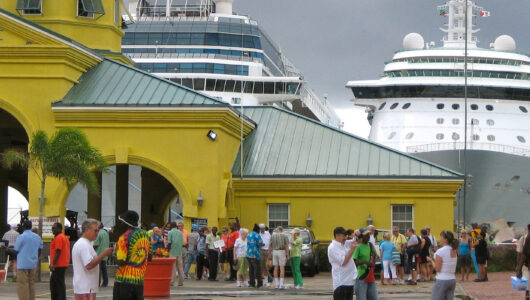Saint Kitts and Nevis
Saint Kitts and Nevis, formally known as the Federation of Saint Christopher and Nevis, is an island nation in the West Indies and a member of the Commonwealth. Located in the Leeward Islands chain of the Lesser Antilles, it is the smallest sovereign state in the Western Hemisphere, both in terms of area and population. The capital city, Basseterre, is situated on the larger island of Saint Kitts, while the smaller island of Nevis is approximately 3 kilometers southeast across a shallow channel called “The Narrows.” English is the official language, but Saint Kitts Creole is also widely spoken.
Saint Kitts was originally named “Liamuiga,” which means “fertile land” in the language of its indigenous Kalinago Carib inhabitants. This name was preserved when the tallest peak on Saint Kitts was renamed Mount Liamuiga upon the country’s independence in 1983. Christopher Columbus sighted Nevis in 1493 and initially named it San Martín. The name “Nevis” is derived from the Spanish Nuestra Señora de las Nieves, meaning “Our Lady of the Snows,” a reference to the white clouds frequently seen around the summit of Nevis Peak.

Saint Kitts and Nevis Real Estate
The real estate market in St. Kitts and Nevis has seen significant growth, driven by development projects and the Citizenship by Investment (CBI) Program. Here’s an overview of the current real estate landscape and acquisition process in St. Kitts and Nevis:
Market Overview:
- Influence of CBI Program: The CBI Program has substantially shaped the real estate market, enhancing the availability and quality of luxury properties, including beachfront apartments, high-end homes, and hotel suites. This program is a major driver for investment in the region.
- Tax Advantages: St. Kitts and Nevis offers highly attractive tax incentives for property owners, including:
- No Income Tax: Property owners do not pay income tax.
- No Capital Gains Tax: There are no taxes on capital gains from property sales.
- No Inheritance or Gift Tax: These taxes do not apply, making estate planning more straightforward.
- Value for Money: Compared to other Caribbean destinations, property in St. Kitts and Nevis provides excellent value, attracting investors with its competitive pricing and luxurious offerings.
- Growing Tourism Sector: The increasing tourism industry enhances rental income potential for property owners. With a robust infrastructure of resorts, golf courses, restaurants, and spas, there is ample opportunity for generating rental income through short-term vacation rentals.
- International Connectivity: The islands are well-connected with direct flights from the USA and the UK to St. Kitts and flights to Nevis from San Juan (Puerto Rico) or St. Maarten, making it accessible for international investors and tourists.
Acquisition Process:
- CBI-Approved Properties: For those pursuing citizenship through investment, it’s crucial to ensure that the property is part of a government-approved CBI project. These projects meet specific criteria set by the government to qualify for the CBI Program.
- Alien Landholding License: If the property is not part of a CBI-approved project, non-citizens must acquire an Alien Landholding License before purchasing. This additional step is necessary for foreign ownership of land.
- Legal Representation: Engaging legal representation is highly recommended to navigate the local legal framework and ensure compliance with all regulations. A local lawyer can provide valuable assistance throughout the acquisition process.
- Site Visit: While not mandatory, visiting the island before purchasing is strongly advised. It allows potential buyers to experience the property and surrounding areas firsthand, ensuring the investment aligns with their expectations.
The real estate market in St. Kitts and Nevis offers attractive opportunities, particularly for those leveraging the CBI Program. The combination of favorable tax conditions, competitive property values, and a burgeoning tourism sector makes it a compelling choice for investors. However, navigating the acquisition process requires attention to legal requirements, including ensuring that the property is part of a CBI-approved project or obtaining the necessary licenses for foreign ownership.
Frequently Asked Questions (FAQ)
Is there any restriction to acquire real estate in St. Kitts and Nevis by foreign buyers?
Foreign buyers can acquire real estate in St. Kitts and Nevis with certain conditions. There are no restrictions for properties in Frigate Bay. For other areas, foreign buyers must either acquire pre-approved property or obtain an alien landholding license before making a purchase.
How can immovable property in St. Kitts and Nevis be acquired?
Immovable property in St. Kitts and Nevis can be acquired through citizenship by investment programs or private sales.
Is it necessary to open a bank account to purchase property, and if so, what is the procedure?
No, it is not necessary for the applicant to open a bank account to purchase property.
What additional expenses are associated with a real estate transaction?
The additional expenses for a real estate transaction include:
- Legal Fees: Approximately 1–2% of the purchase price.
- Property Taxes: 0.002% of the property value per year.
- Escrow Agent Fees: Typically 1% of the purchase price.
What returns can be expected from property investment in St. Kitts and Nevis?
Expected returns on property investment can vary:
- Hotel Investments: Typically yield 2–4% per year, depending on location.
- Local Property Investments: Investing in areas near colleges or tourist destinations can yield over 4% per year.
How is rental income taxed?
There is no income tax on rental income in St. Kitts and Nevis.
What other property-related taxes and charges are imposed?
Property taxes in St. Kitts and Nevis are:
- Residential Property: 0.2% of its value per year.
- Commercial Property: 0.3% of its value per year.
